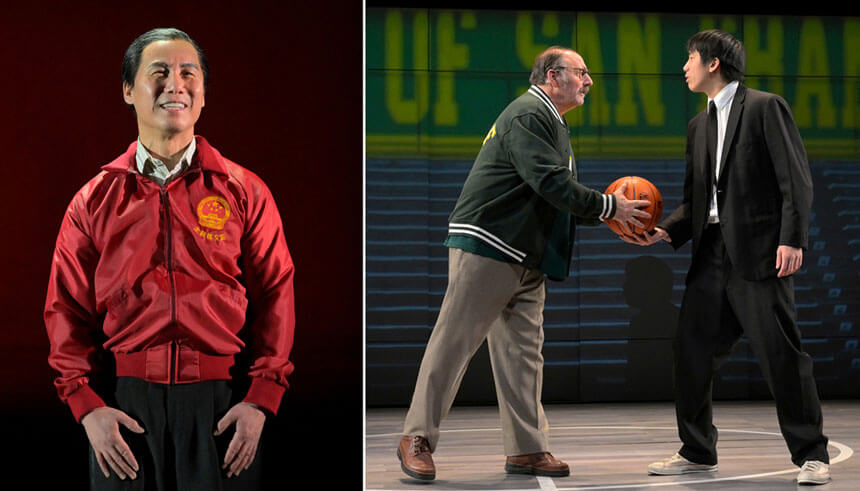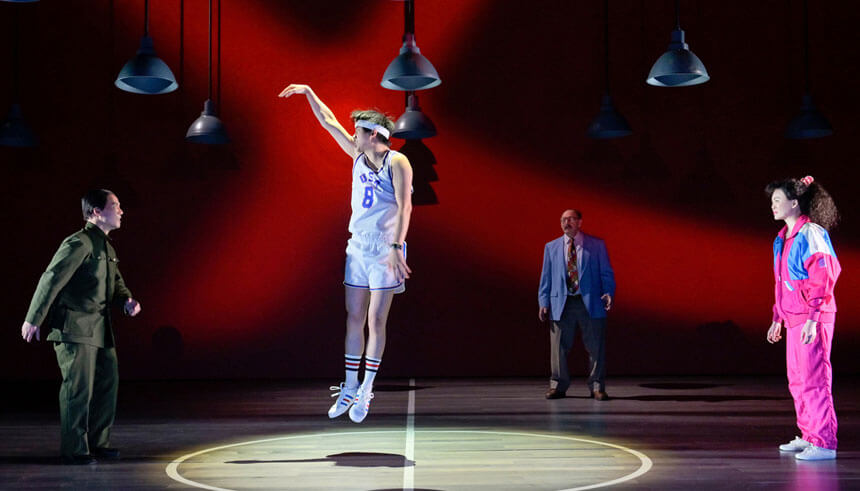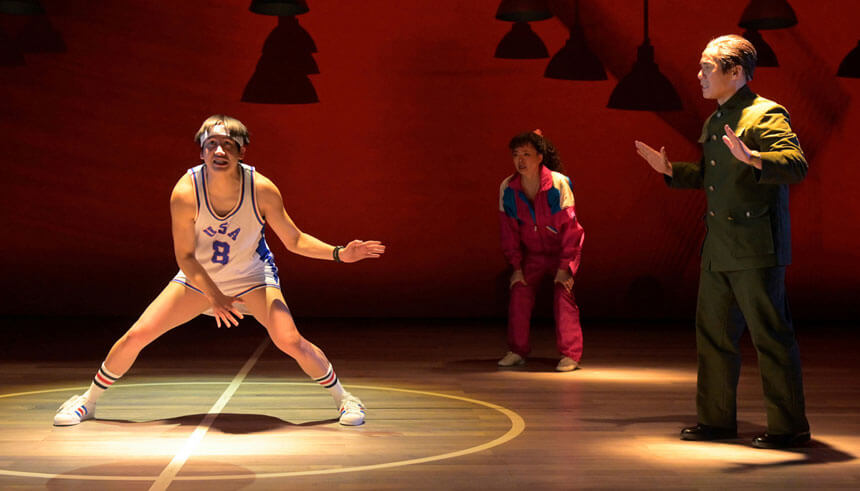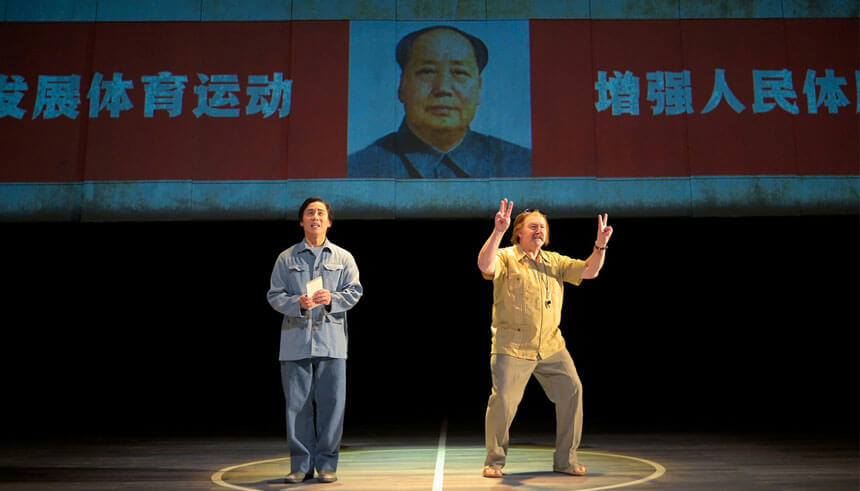Dialogues
BD Wong: Taking “The Great Leap” into Theater and Hollywood
By

The award-winning actor talks about his play “The Great Leap” and the post-“Crazy Rich Asians” world.
It has only been in the past few years in Hollywood’s over 120-year history that conversations about representation in film and media have been taken seriously. BD Wong, Emmy-nominated and Tony Award-winning actor, has lived—and fought—through it all. With a career spanning decades and mediums, Wong has starred in films like “Jurassic Park,” shows such as “Mr. Robot” and “Law & Order: SVU,” and critically acclaimed theater productions like “M. Butterfly.” Along with his numerous stage and screen credits, he is a prominent member and supporter of the LGBTQ community, and an advocate for greater diversity and representation in media.
Currently, Wong stars as Beijing basketball coach Wen Chang in Lauren Yee’s play “The Great Leap,” which runs at San Francisco’s American Conservatory Theater until March 31. The play, taking place in both 1971 and 1989, is based on the real-life experiences of Yee’s father Larry traveling around China and playing basketball. “The Great Leap” follows an American college basketball team preparing to go to China for an exhibition game, where East-meets-West will come to a head in new and unexpected ways.
We talk with Wong about the play and his role as Wen Chang, Asian actors in Hollywood, and how the play’s themes are even more relevant in today’s political backdrop.

What attracted you to “The Great Leap” and the character of Wen Chang?
Originally, when I was given the play, I loved it because I’m always looking for plays that manage to be simultaneously funny and emotionally satisfying—that’s also something that’s very rare. Lauren created this play and this character that allowed both of those things to coexist, and that’s challenging and very satisfying to be able to do. It’s a very well-written character and a very well-written play.
I did the play last year at the Atlantic Theater Company (in New York). It was a very beautiful production; it was a very successful one of a play that I really love. But when I had a chance to do this in San Francisco, where I grew up, I kind of jumped at the chance to do it because it’s a very rare opportunity not only to perform here, but to perform something that you’ve already done and you already enjoy doing.
I felt also a kind of curiosity about doing the play again, revisiting it in a completely different context—meaning, a much bigger theater, with a completely different set of production, design team members, director and cast. That’s a creative challenge and a creative opportunity that you never get.
How have the differences between the New York production and this one changed the way you look at or perform in the play?
What’s different about the productions, as I suspected, is mostly the nature of the production itself being a much bigger production. The (A.C.T.’s) Geary Theater is a 1,000-seat theater, and the Atlantic stage is 99 seats. In a small house you’re emphasizing more nuance, things between the characters—moments that are much more cinematic because the actors are able to use much more subtlety in their performance.
In a bigger theater, you’re relying on different things to tell some of that same story. So, it’s a very good exercise for an actor to do this. I’ve never had a situation where I’ve done this. I found it really eye-opening. Even the usage of your voice is completely different, to be heard in a 1,000-seat house. There’s more of a Shakespearean quality to the acting than there is in a small, small, small space.

I just think that it’s different—and wonderfully different—because things change when you make things bigger. The set needs to be more complicated, otherwise it’s not going to stimulate the audience's eye. The costumes need to be designed differently because they are filling a bigger space and they are fulfilling different functions.
The best example that I have is that when I was in the production in New York, I wore one costume throughout the whole play. It was a very small production, so it made sense, and the outfit that I wore was emblematic of this person’s life from beginning to end. Here, I have five or six different costumes. It only makes sense that I would do so, because the evolution of the character becomes a little bit more physical when the space is bigger. It just needs to become more visual.
The sensibilities, emotional arcs of the characters—they’re all intact. Lauren’s involved in the production, so she gives the directors notes about various moments or things that are happening in the individual production. She’ll say, “Well, that’s not really what I meant,” if a character is doing or saying something in a certain way that she didn’t mean. There’s quality control between the two productions because of Lauren’s input, and that tends to make things more similar rather than less similar.
In the context of current U.S.-China political tensions, how do you think “The Great Leap” feeds into or subverts people’s perceptions of U.S.-China relations?
Those U.S.-China relations are true to the time period in which the play takes place—1971 and 1989. And yet, some things never change. Some of those cultural differences never change, and embody themselves in our politics and political relationships. As Asian Americans, I think we’re in a very unique situation where it’s kind of a tug-of-war. I always find myself kind of not wanting to be anti-China because I’m Chinese American. But at the same time, you want to be really critical or circumspect. That’s amazing to me. I love that. I think that people will bring their feelings about U.S.-China relationships, and see them validated or illuminated or simulated in some way or another. That’s definitely guaranteed.
The relationships between these characters—one of them Chinese and one of them American—kind of represent those kinds of relations. It’s hard to explain without spoilers about the play, but it’s really a very satisfying play to watch because it’s laid out very clearly. It’s not hard to figure out. It’s very, very clear, and I think that’s part of her (Lauren Yee’s) craft. She’s able to take these complex issues about complex dynamics and create an entertaining play that is absolutely politically resonant without devaluing any of the aspects of it.

What are you most excited about for the play’s run at A.C.T.?
As Asian Americans, I think that there’s a real satisfaction to being one of the people in the eye of that storm. I’ve always wished for this theater to reach out to the Asian American community. For many years it did so and with increasing enthusiasm, and now it’s kind of in what feels like a golden age where it may actually come to pass that the Asian American community actually shows up.
I remember I had this revelation in New York when I went to go see a revival production of “The Wiz.” I was amazed that the entire audience was black. I was like, oh, I shouldn’t be amazed because that’s how the African American community is with its own content.
Carey Perloff, the former artistic director (of the A.C.T.), to her credit really worked very hard reaching out to the Asian American community. The last play I did in 2014 (“The Orphan of Zhao”) was really successful in bringing out Asian American audiences. I’m really hoping for that again. I’m really hoping that Asian American people, particularly younger ones, really understand the power and the value of them showing up.
The success of “Crazy Rich Asians” certainly seemed to have changed things. How do you think that will affect Hollywood and support of the play?
I think that was a real watershed. I think that Asian Americans were actually renting out theaters doing screenings of that movie, which shows you the possibilities of that and encourages you as an artist to keep working. There’s a “what am I doing it for if they’re not going to show up” kind of thing. So they needed “Crazy Rich Asians” to be great and endorsed by the zeitgeist in order for them to get behind it, and that was really great that they did so. Hopefully, that is a mechanism that can be more and more well-oiled.
This production is not purporting to be “Crazy Rich Asians,” but it is the local equivalent of Asian Americans doing their thing, in a way that they will really enjoy watching. For them to bring their kids to this, it will be really great. It’s a really great family show. I think to A.C.T.’s credit, it’s a very well-selected play to this community. It’s not an Asian-Americans-as-victims play. There’s a place for those plays and people feel validated by them, but this is not that play. This is wildly entertaining and deeply emotionally satisfying—and funny.
Subscribe to the Reach Further Newsletter
Get inspiring stories in your inbox every month.

